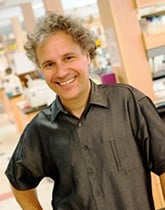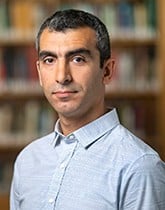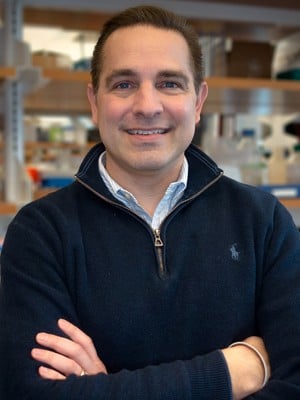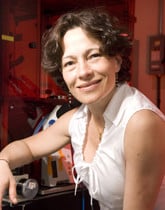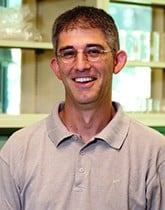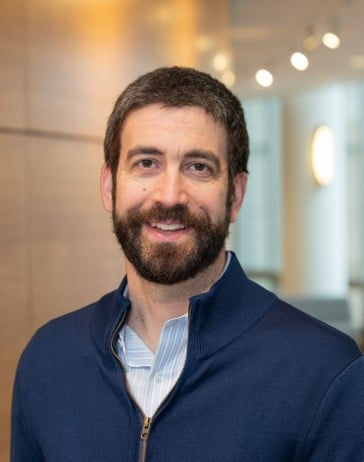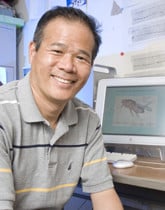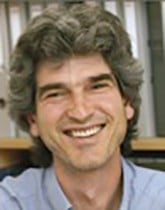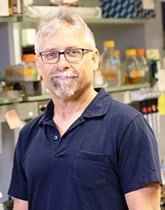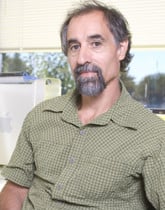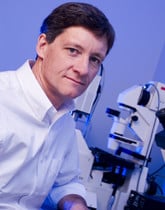Primary Appointments
-

Victor Ambros, PhD
We study gene regulatory mechanisms controlling the timing of animal development, using the C. elegans model system. Developmental timing regulators in C. elegans include microRNAs that control the stage-specific expression of key transcription factors. We aim to understand the molecular mechanisms of post-transcriptional gene regulation by microRNAs, and how microRNAs function in regulatory networks affecting development and disease.
-

Raffi Aroian, PhD
The Aroian Group researches infectious diseases and parasites. Our mission is to discover new cures and new basic information that leads to cures for major diseases that afflict humankind, namely intestinal roundworms and bacterial pathogens.
-

Ozkan Aydemir, PhD
Our access to genetic data continues to increase as the genomics technologies advance, so does our need to have the appropriate tools to make sense of these data. I am interested in adapting the existing computational tools to new data sets as well as developing new software, especially in multi-omics data integration and interpretation, to elucidate our understanding of the effects of genetic variation on a wide range of human diseases including type 1 diabetes, neurodegenerative disorders, malaria and other infectious diseases.
-

Michael Brehm, PhD
Our laboratory studies the biological mechanisms that control human immune responses to infectious agents and transplanted non-self tissues. To investigate these mechanisms we are using humanized mouse models that contain functional human immune systems. The humanized mice are generated using immnodeficient mice, which are engrafted with either human hematopoietic stem cells or with mature human immune cells. These humanized mouse models allow the direct study of human immunity that is not possible with patients.
-

Craig Ceol, PhD
Our laboratory is interested in the genetic and molecular mechanisms underlying tumor initiation and maintenance. We focus primarily on melanoma, using genetically-engineered zebrafish models and mammalian cultured cells to identify unique features of cancer cells that can potentially be used for diagnostic, prognostic or therapeutic benefit.
-

Caroline Chidley, PhD
Being able to study metabolism at the molecular level is fundamental to improving our understanding of human disease. We utilize high-resolution, accurate-mass spectrometry coupled to liquid-chromatography, and collaborate with researchers to help them measure metabolites and lipids in a variety of model organisms and metabolic disease models, including diabetes and cancer.
-

Silvia Corvera, MD
Our laboratory is interested in understanding the basic physiopathology of type 2 diabetes, specifically the role of adipose tissue physiology in diabetes pathogenesis.
-

Michael Czech, PhD
Our laboratory group is dedicated to the discovery of molecular mechanisms whereby insulin signaling regulates energy homeostasis. This quest includes RNAi screens, digital imaging and TIRF microscopy, phenotyping mice with gene knockouts and analysis of human adipose tissues. We hope to translate our findings to the prevention and treatment of type 2 diabetes.
-

Roger Davis, PhD
The cJun NH2-terminal kinase (JNK) signal transduction pathway is implicated in several stress-related disease processes including cancer, diabetes, inflammation, and stroke. Our hope is that drugs targeting the JNK pathway may be useful for the treatment of these diseases. The goal of this laboratory is to understand the molecular processes that are engaged by JNK in both health and disease.
-

Accalia Fu, PhD
We are inspired by the powerful influence of molecular metabolism on cell function and fate. Our purpose is to study this in pancreatic beta cells and local immune cells in health, obesity and diabetes. We identified metabolic pathways which protect against inflammation associated with metabolic disease. At the moment, we are contemplating how these pathways shape the metabolic milieu of pancreatic islets and local immune cell activities, which is an area we know almost nothing about. We have developed a new system to study this in and rely on technologies like metabolomics, proteomics and transcriptomics.
-

Paul Greer, PhD
We are broadly interested in the fundamental questions of how animals sense and interpret chemical signals to generate appropriate organismal responses and how these processes are disrupted in human neurological disorders. To address these questions we are exploring novel mechanisms by which the olfactory system senses behaviorally relevant external stimuli and characterizing the function of microglia in detecting internal chemical cues.
-

Dale Greiner, PhD
Our lab studies human immune responses, both how to turn them off for the treatment of type 1 diabetes and autoimmunity and conversely, to use the same pathways to turn the immune response on for the treatment of cancer. We utilize our unique animal models of human immune responses for investigating these approaches to down regulate as well as activate the human immune system.
-

David Guertin, PhD
We study the molecular basis of growth and how defects in growth regulatory pathways contribute to cancer, metabolic disorders, and aging. In particular we are trying to understand how cells simultaneously sense nutrient availability, energy levels, and growth factors and use this information to control cell metabolism, cell growth, and cell proliferation. Our approach is multidisciplinary and employs genetic, cell biological, and biochemical strategies using mice, stem cells, and established mammalian cell lines.
-

Nathaniel Hafer, PhD
I am interested in entrepreneurship and accelerating the commercialization of biomedical technologies. I approach this objective in three ways: 1) as the Director of Operations for the UMass Center for Clinical and Translational Science (UMCCTS), which provides research resources and training to our community; 2) as Co-Director of M2D2, a medical device and biotech incubator based at UMass Chan and our sister campus UMass Lowell; 3) as an instructor of courses in biomedical entrepreneurship and commercialization.
-

Tony Ip, PhD
We use Drosophila melanogaster, the common fruit fly, as a model to study innate immune response and stem cell regulation in the adult intestinal tract. The intestinal tract of the adult fly is a relatively simple organ formed by a layer of epithelial cells interspersed with stem cells. The intestinal tract frequently faces environmental challenges such as pathogenic chemicals and microbes. We are studying how these pathogens stimulate innate immune response and stem cell division, both of which are essential for the survival of the animal.
-

Jason Kim, PhD
Our research investigates obesity, diabetes and its complications using elegant metabolic procedures and transgenic mouse models of altered metabolism. Our NIH-funded projects examine the role of inflammation in insulin resistance and cardiovascular diseases. The goal of our research is to understand how obesity causes diabetes and to find its cure.
-

David Lambright, PhD
Crystallographic, biophysical, biochemical, and cell biological approaches are used to investigate mechanisms of membrane trafficking and cell signaling. Defects in these fundamental regulatory mechanisms play critical roles in genetically linked disorders and complex disease states including cancer and diabetes.
-

Jeremy Luban, MD
Distinguished physician–scientist Jeremy Luban, MD has been appointed professor of molecular medicine at UMass Chan Medical School and the David L. Freelander Memorial Professor in HIV/AIDS Research. Dr. Luban’s research focuses on understanding host cell factors that contribute to HIV viral replication. He has identified Cyclophilin A and Trim 5 among more than thirty HIV-1 regulatory host factors. His work will contribute to the development of drugs and vaccines targeting HIV virus infections and other disease states. NIH/NIDA named him a 2012 Avant-Garde Awardee for HIV/AIDS research.
-

Katherine Luzuriaga, MD
Research in the laboratory is focused on understanding viral and host factors that contribute to the establishment of persistent viral infections in humans, including human immunodeficiency virus (HIV), Epstein-Barr virus (EBV), and cytomegalovirus (CMV).
-

Rene Maehr, PhD
Type 1 Diabetes (T1D) is the result of an autoimmune destruction of insulin producing, pancreatic beta cells. The events leading to the disease have usually occurred long before diagnosis and are based on complex interactions between genes and the environment. The currently available rodent models for T1D can only represent a limited number of patients leaving open the question how many different types of T1D exist. To overcome these difficulties and expand our understanding of T1D and other diseases targeting the immune system we are building in vitro models using human pluripotent stem cells. In those stem cell-based model systems genetic and developmental aspects of the disease can be elucidated. The long-term goal is to recapitulate the disease in a patient-specific manner and to identify novel treatment strategies.
-

Gary Ostroff, PhD
Our laboratory works at the interface of nanomaterial science and biology to develop oral DNA, siRNA, protein and small molecule delivery technologies based on beta-glucan particles processed into porous hollow microspheres loaded with multi-layered nanostructured payload complexes. We collaborate with many investigators to develop research and translational applications for this delivery technology targeting chronic diseases using gene therapy, RNAi, vaccine and small molecule inhibitor approaches.
-

Gregory Pazour, PhD
We are interested in the function of the mammalian primary cilium. These organelles play vital roles in the development of mammals and in the etiology of diseases such as polycystic kidney disease and blindness. Our work combines in vitro cell culture studies with mutant mouse models to understand the role of cilia in controlling kidney architecture and formation of the photoreceptor outer segment.
-

Craig Peterson, PhD
Work in the lab is focused on understanding how chromosome structure influences gene transcription, DNA replication and repair, with special emphasis on identifying and characterizing the cellular machines that control chromosome dynamics. We use a combination of chromatin biochemistry, analytical ultracentrifugation, and yeast molecular genetics.
-

Joel Richter, PhD
Our lab studies the biochemistry of post-transcriptional gene expression, particularly cytoplasmic polyadenylation and translational control. We also examine how these processes influence early animal development, cell division and cellular senescence, and neuronal synaptic plasticity and memory consolidation.
-

Kuang Shen, PhD
The Shen lab studies nutrient sensing in cells. Amino acids are one of the basic building blocks of all living organisms. In eukaryotic cells, a dedicated pathway, the mTORC1 pathway, senses the presence or absence of amino acids in the environment, and makes the decision to grow or not. We are interested in using biochemical and biophysical tools including enzymatic kinetics, structural biology (cryo-EM), and single molecule biophysics, to investigate the mTORC1 pathway at the molecular level. We aim to gain a fundamental understanding of this biological process and how its malfunction could cause human diseases.
-

Jessica Spinelli, PhD
The Spinelli lab is broadly interested in understanding the mechanisms of cellular sensing and adaptation to metabolic niches. We study these pathways at the fundamental level in healthy mammals and upon dysfunction caused by diseases such as cancer, diabetes, obesity, mitochondrial myopathies, and ischemia. Our lab is particularly interested in mitochondria, which are metabolic hubs of the cell that contribute to homeostasis in multifaceted ways. Notably, to capture the metabolic state of cells and tissues, we frequently utilize high resolution mass spectrometry (metabolomics), which is set up as a standard workflow in our laboratory.
-

Caterina Strambio, PhD
Caterina Strambio De Castillia grew up in Italy and received her Laurea in Biologia (equivalent to B.S./M.S.) from the University of Pavia in 1988. She obtained her Ph.D. (1992-1998) working with Gunter Blobel at The Rockefeller Universitycore. Her work has been supported by the American Cancer Society, the European Union and the Swiss National Science Foundation. In 2012, Dr. Strambio De Castillia joined the Program in Molecular Medicine at the UMass Chan Medical School.
-

John Sullivan, MD
Dr. Sullivan, a founding faculty member of the Program in Molecular Medicine, was appointed Emeritus Professor of Molecular Medicine in 2019. Dr. Sullivan has an established record as a physician scientist in the fields of immunology and virology. He currently serves as the Chief Scientific Advisor for the Program in Molecular Medicine and Associate Director of Mentoring for the Medical Scientist Training Program.
-

William Theurkauf, PhD
Work in the lab addresses RNA localization and embryonic patterning, the response of mitotic cells to DNA damage, and small RNA function in germline development. Studies combine high resolution imaging, genetic, and molecular approaches in Drosophila and mammalian cultured cell systems.
-

Amy Walker, PhD
Using C. elegans and mammalian models, we study how lipid homeostasis is affected by genetics or diet and how transcriptional control of methyl donor supply may affect cellular processes such as epigenetics. We also examine links between metabolism and cellular function potentially contributing to human metabolic disorders.
-

Maria Zapp, PhD
An essential and characteristic step in human immunodeficiency virus type-1 (HIV-1) replication is the export of the intron-containing gag-pol and env mRNAs from the nucleus to the cytoplasm. The viral regulatory protein Rev mediates this event, in conjunction with the cellular nuclear export machinery and several protein cofactors. Our long-term objective is to gain a detailed understanding of the cellular factors and molecular mechanisms involved in Rev-directed nuclear export, cytoplasmic localization, and function of HIV-1 RNAs.
-

Jin Zhang, PhD
We are interested in the interplay between sensory systems and internal physiology. For example, taste is largely impacted by our internal state (e.g. food tastes better when we are hungry); conversely, taste stimulation triggers downstream signaling responses, and long-term taste experience shapes physiology and behavior. We are currently using the mammalian taste pathway as an entry point, to understand how the nervous system integrates external and internal information to drive behavior and maintain homeostasis.

